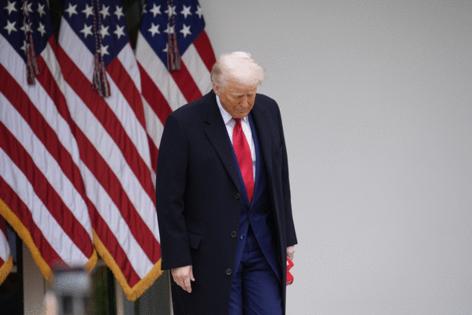Trump reversals on Fed chair, China tariffs send markets higher
Published in Political News
WASHINGTON — The Trump administration is looking for an off-ramp from the trade war it started with China earlier this month, calling its tariffs on Chinese goods unsustainable as major retailers warn the White House that U.S. consumers will begin seeing supply shortages and higher prices within weeks.
Markets soared on comments from President Donald Trump and his treasury secretary, Scott Bessent, in recent days, acknowledging the current tariff rate of 145% on China will have to come down “substantially.” But subsequent comments from Bessent on Wednesday, that the White House would not lower the rate without reciprocal action from Beijing, cooled enthusiasm on Wall Street.
It is unclear whether China will cooperate, however, when it sees pain first setting in for American households that could maximize its leverage in trade negotiations. Cailian Press, a Chinese media outlet focused on finance, characterized the administration’s latest rhetoric as “a sign that Trump is already softening stance on his signature tariff policies.”
On Wednesday, Trump told reporters that talks with China were “active” over a “fair deal,” and that Beijing has expressed interest in negotiating a deal.
“I’m not going to say, ‘oh, I’m going to play hardball with China,’” Trump said Tuesday. “We’re going to be very nice. They’re going to be very nice. And we’ll see what happens.”
Trump also said he was not looking to fire Jerome Powell, chair of the Federal Reserve, despite posting threats he might do so on social media over Powell’s remarks warning that Trump’s trade policies would increase prices and slow economic growth.
The current 145% rate “is very high, and it won’t be that high. Not gonna be that high,” Trump added. “No, it won’t be anywhere near that high. It’ll come down substantially, but it won’t be zero.”
The president’s remarks came one day after he held a meeting with chief executives from three major big box retailers — Walmart, Target and Home Depot — who warned him that supply chain disruptions were already underway and would lead to empty shelves at U.S. stores in a matter of weeks, Axios reported.
In another private meeting Tuesday, held by JP Morgan Chase & Co. between Bessent and investors and first reported by the Wall Street Journal, the treasury secretary acknowledged that existing import duties on China were “not sustainable” and that “de-escalation” was necessary with Beijing. The nature of the private meeting, which was proceeded by a market surge, renewed concerns over insider trading.
“I wish to be clear,” Bessent said in separate, public remarks Tuesday to a forum of the Institute of International Finance. “America first does not mean America alone. To the contrary, it is a call for deeper collaboration and mutual respect among trade partners.”
The secretary’s remarks echoed an earlier motto from Trump’s first administration, which pursued more moderate trade policies, and marked a departure in tone from just three weeks ago, when Trump announced massive tariff increases on countries around the world.
Since that time, the president has partially lowered many of those tariff rates, but no new trade agreements have been struck.
“For decades, our country has been looted, pillaged, raped and plundered by nations near and far, both friend and foe alike,” Trump said at the time, announcing the global tariff hikes on April 2. “Our country and its taxpayers have been ripped off for more than 50 years, but it is not going to happen anymore. It’s not going to happen.”
Trump had implemented tariffs on China before his April announcement, levying 20% on Chinese imports over the country’s role in producing precursor chemicals that play a major role in the U.S. fentanyl crisis.
He then increased that to 34% on April 2. China retaliated, prompting Trump to increase tariffs on China to 145%, including the 20% figure applied over fentanyl.
A week of devastating losses on Wall Street that followed the April 2 event, followed by concerning activity in the bond market, ultimately led Trump to lower tariff rates on most U.S. trading partners down to a universal 10% rate — welcome relief to allies such as Vietnam, which had faced a 46% tariff rate, and the European Union, hit with a 20% rate. But the 145% rate on Chinese goods remained.
Bessent, in his remarks to the finance institute, struck a conciliatory note on his efforts to get China to the negotiating table.
“China, in particular, is in need of a rebalancing,” Bessent said. “Recent data shows the Chinese economy tilting even further away from consumption toward manufacturing. China’s economic system of growth, driven by manufacturing exports, will continue to create even more serious imbalances with its trading partners if the status quo is allowed to continue.”
“China’s current economic model is based on exporting its way out of troubles,” he added. “It’s an unsustainable model that is not only harming China, but the entire world. China needs to change. The country knows it needs to change. Everyone knows it needs to change, and we want to help it change, because we need re-balancing, too.”
©2025 Los Angeles Times. Visit at latimes.com. Distributed by Tribune Content Agency, LLC.




























































Comments